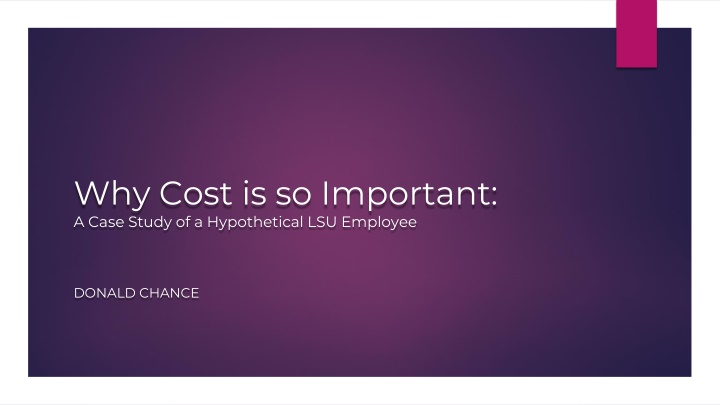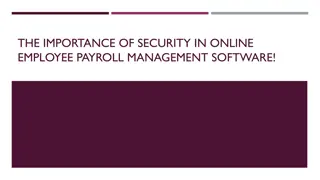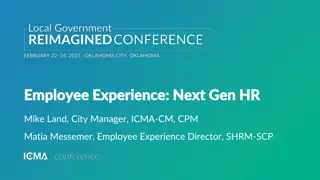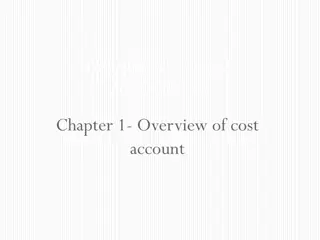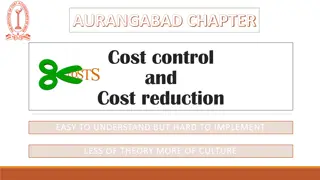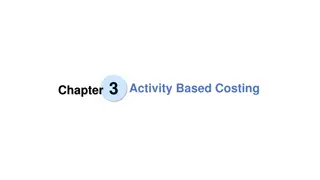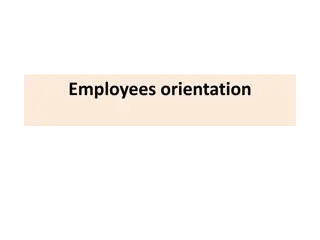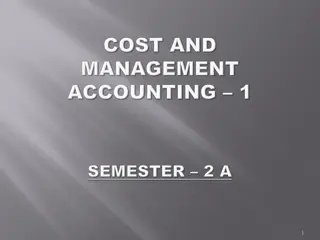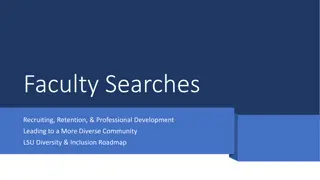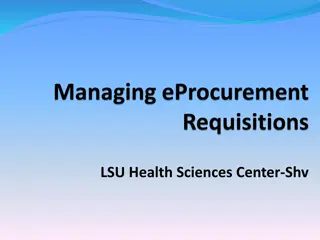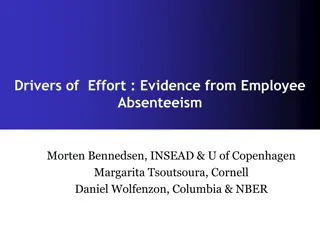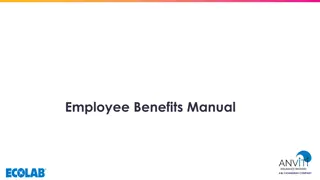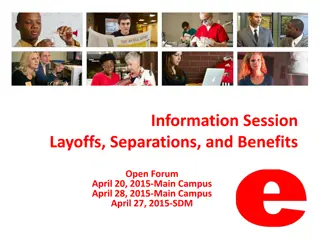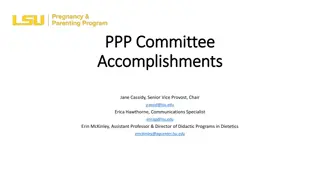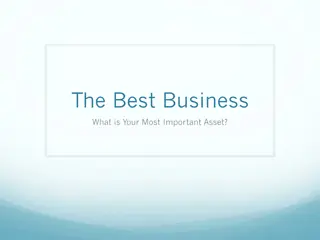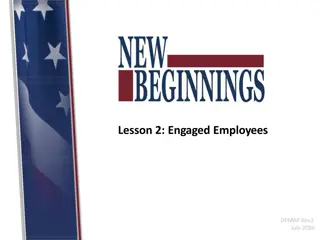The Importance of Cost Management: A Case Study of an LSU Employee
Veronica Moeller, a 55-year-old LSU employee, discovers the significance of understanding the costs associated with her 403(b) retirement account thanks to her daughter's insight. Despite not feeling the impact of a 1% fee, Veronica realizes the importance of knowing where her money is going and what she is getting in return. This case study highlights the necessity of cost awareness in securing a comfortable retirement.
Download Presentation

Please find below an Image/Link to download the presentation.
The content on the website is provided AS IS for your information and personal use only. It may not be sold, licensed, or shared on other websites without obtaining consent from the author.If you encounter any issues during the download, it is possible that the publisher has removed the file from their server.
You are allowed to download the files provided on this website for personal or commercial use, subject to the condition that they are used lawfully. All files are the property of their respective owners.
The content on the website is provided AS IS for your information and personal use only. It may not be sold, licensed, or shared on other websites without obtaining consent from the author.
E N D
Presentation Transcript
Why Cost is so Important: A Case Study of a Hypothetical LSU Employee DONALD CHANCE
Hypothetical LSU Employee Case Study Veronica Moeller is a 55-year old LSU employee. She is divorced and completely self-supporting. She has a 403(b) account through LSU that has a balance of $300,000 (rounded). This is under the pre-September 2018 plan. She is in the state pension system but figures that the income from her pension will be just enough to live. Her 403(b) is supposed to make the difference in getting by and living comfortably. She hopes to retire in 10 years.
Hypothetical LSU Employee Case Study Veronica adult daughter, Leigh Ann, a recent LSU graduate with an MS in finance, decides to ask her about her retirement savings. Leigh Ann: Mom, how much are you paying for your 403(b) account? Veronica: I don t really know, but I don t think it s very much. I never see any bills or anything. Leigh Ann : Let me take a look at your statement.
Hypothetical LSU Employee Case Study After reviewing the statement, Leigh Ann estimates that Veronica is paying 0.2% for admin fees, and the weighted expense ratio of her mutual funds is 0.8% for a total of 1% (rounded). Leigh Ann : Mom, you re paying 1%. Veronica: That s not much. Last year I got a 1% raise, and I can t even feel it.
Hypothetical LSU Employee Case Study Leigh Ann : Yeah, I ve heard that story too. Remember my ex-boyfriend Jason? He told me he once went to Cancun with some friends. He was drinking a lot and in a generous mood, like buying drinks for everyone in the bar. Then he woke up the following day having maxed out his credit cards. He had no recollection, though he did have a headache. Veronica: Well, I hope that friend wasn t really you.
Hypothetical LSU Employee Case Study Leigh Ann : No, it wasn t but it might as well have been you, mom. You re spending three grand a year and you have no idea that you re doing it. On top of that I m pretty sure you don t know what you re getting for your money. What do you think you re getting? Veronica: Well, they have an 800 number I ve called a few times, like right after the divorce. I get a statement every quarter, and my money has gone up. I m shocked I have this much money. How can I complain?
Hypothetical LSU Employee Case Study Leigh Ann: And how much of that increase in your money has come from your additional contributions, the fact that the market has gone up, and backing that out, has there been any performance you can attribute to the manager of the mutual fund? Veronica: I have no idea. I don t even understand what you re talking about. That s why I pay them the money. Leigh Ann : That s what I thought, mom. I m pretty sure they ve never answered those questions for you. And to be honest, you really don t have that much money.
Hypothetical LSU Employee Case Study Veronica: Well, thanks for cheering me up, young lady. Leigh Ann: Don t worry, mom. There s plenty you can still do to cut your costs and get better control of your money. Veronica: Do you think I need a financial advisor? Leigh Ann: What, and give him another 1% of your money? Veronica: What should I do?
Hypothetical LSU Employee Case Study Leigh Ann: For now, I ll be your financial advisor. If you didn t have me, however, I would advise you to invest in low cost index mutual funds. That s what Warren Buffett says you should do. And I m betting Jimmy Buffett would agree. I know how much you like him. Veronica: Thanks, Leigh Ann. Tell you what, I m taking you to Margaritaville in Biloxi, this weekend.
Why are People Fooled by Investment Management Costs? The 1% illusion To the average person, a number like 1% is insignificant. So let s say, every Sunday, you go to the convenience store and buy a newspaper for $2.00. The newspaper announces a 1% price increase. Your paper now costs $2.02. Outside of having to scrounge around for two pennies, you consider this insignificant. Employees who get 1% raises feel insulted.
You can fool some of the people all of the time In 1997, Mark Carhart (Southern Cal) published a study in The Journal of Finance that showed that the single most distinguishing factor in predicting mutual fund performance is the cost. And even if an investor is aware of the cost, Brad Barber (UC Davis), Terrance Odean (UC Berkeley), and Lu Zhang (Michigan) in a study published in The Journal of Business in 2005 find that 84% of investors believe that the more expensive the fund, the better the performance. This is simply not true. In fact, it is the opposite.
Overwhelming Choices = Bad Choices The industry presents so many investment opportunities, in fact too many, that even an experienced financial advisor, has a hard time making the optimal decision. There is a psychological theory that says that the more choices you give a person, the more likely he ll make a choice he ll regret. (Barry Schwartz, The Paradox of Choice: Why More is Less , 2004 and Sheena Iyengar, The Art of Choosing, 2011). Unfortunately in the investment management industry, the customer is likely to make the wrong choice but be too unaware to regret it.
The Salad Bar Effect Retail investment decisions are like a salad bar, except: A salad bar has full transparency Investment decisions have virtually no transparency Fortunately under the new LSU 403(b) plan, you have full transparency and a limited number of efficient, low-cost choices. Enjoy your salad.
Potential Savings from New LSU Plan Assume a $5,000 initial annual deposit, 2% increase in savings per year. The additional money you would accumulate after 35 years, assuming same returns as S&P 500 over last 35 years:
Potential Savings from New Plan Lowest vs. highest cost savings by provider
Potential Savings From New Plan Lowest cost fund of lowest cost provider vs. highest cost fund of highest cost provider
